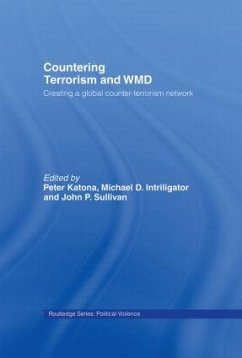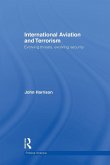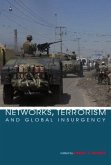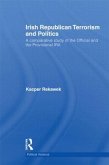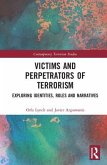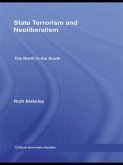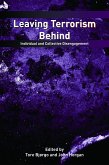Peter Katona / John Sullivan / Michael D. Intriligator (eds.)Creating a Global Counter-Terrorism Network
Countering Terrorism and WMD
Creating a Global Counter-Terrorism Network
Herausgeber: Katona, Peter; Sullivan, John P.; Intriligator, Michael D.
Peter Katona / John Sullivan / Michael D. Intriligator (eds.)Creating a Global Counter-Terrorism Network
Countering Terrorism and WMD
Creating a Global Counter-Terrorism Network
Herausgeber: Katona, Peter; Sullivan, John P.; Intriligator, Michael D.
- Gebundenes Buch
- Merkliste
- Auf die Merkliste
- Bewerten Bewerten
- Teilen
- Produkt teilen
- Produkterinnerung
- Produkterinnerung
This volume shows us that in order to deal with today's Fourth Generation asymmetric warfare by terrorist groups using conventional arms and weapons of mass destruction, we need a new 'global networked' approach. The contributors examine the various attempts that have been made to counter the latest wave of terrorism, including the US strikes against Afghanistan and Iraq, President George W. Bush's declaration of a 'war against terrorism', the creation of the US Department of Homeland Security, and the 9/11 Commission. Drawing from our experience with 'Terrorism Early Warning' and the…mehr
Andere Kunden interessierten sich auch für
![International Aviation and Terrorism International Aviation and Terrorism]() John HarrisonInternational Aviation and Terrorism49,99 €
John HarrisonInternational Aviation and Terrorism49,99 €![Networks, Terrorism and Global Insurgency Networks, Terrorism and Global Insurgency]() Robert J. Bunker (ed.)Networks, Terrorism and Global Insurgency75,99 €
Robert J. Bunker (ed.)Networks, Terrorism and Global Insurgency75,99 €![Understanding Terrorist Innovation Understanding Terrorist Innovation]() Adam DolnikUnderstanding Terrorist Innovation60,99 €
Adam DolnikUnderstanding Terrorist Innovation60,99 €![Irish Republican Terrorism and Politics Irish Republican Terrorism and Politics]() Kacper RekawekIrish Republican Terrorism and Politics190,99 €
Kacper RekawekIrish Republican Terrorism and Politics190,99 €![Victims and Perpetrators of Terrorism Victims and Perpetrators of Terrorism]() Victims and Perpetrators of Terrorism172,99 €
Victims and Perpetrators of Terrorism172,99 €![State Terrorism and Neoliberalism State Terrorism and Neoliberalism]() Ruth BlakeleyState Terrorism and Neoliberalism199,99 €
Ruth BlakeleyState Terrorism and Neoliberalism199,99 €![Leaving Terrorism Behind Leaving Terrorism Behind]() Tore Bjorgo / John Horgan (eds.)Leaving Terrorism Behind236,99 €
Tore Bjorgo / John Horgan (eds.)Leaving Terrorism Behind236,99 €-
-
-
This volume shows us that in order to deal with today's Fourth Generation asymmetric warfare by terrorist groups using conventional arms and weapons of mass destruction, we need a new 'global networked' approach. The contributors examine the various attempts that have been made to counter the latest wave of terrorism, including the US strikes against Afghanistan and Iraq, President George W. Bush's declaration of a 'war against terrorism', the creation of the US Department of Homeland Security, and the 9/11 Commission. Drawing from our experience with 'Terrorism Early Warning' and the co-production of counter-terrorism intelligence, this book explains the need for such a network and shows how it could be formed. It compiles the opinions of experts from clinical medicine, public policy, law enforcement and the military. These expert contributors identify the nature of a global counter-terrorism network, show how it could be created, and provide clear guidelines for gauging its future effectiveness. This book will be of great interest to all students of terrorism studies, US national security, international relations, and political science in general.
Produktdetails
- Produktdetails
- Verlag: Routledge
- Seitenzahl: 328
- Erscheinungstermin: 21. September 2006
- Englisch
- Abmessung: 240mm x 161mm x 22mm
- Gewicht: 658g
- ISBN-13: 9780415384988
- ISBN-10: 0415384982
- Artikelnr.: 21185440
- Herstellerkennzeichnung
- Libri GmbH
- Europaallee 1
- 36244 Bad Hersfeld
- gpsr@libri.de
- Verlag: Routledge
- Seitenzahl: 328
- Erscheinungstermin: 21. September 2006
- Englisch
- Abmessung: 240mm x 161mm x 22mm
- Gewicht: 658g
- ISBN-13: 9780415384988
- ISBN-10: 0415384982
- Artikelnr.: 21185440
- Herstellerkennzeichnung
- Libri GmbH
- Europaallee 1
- 36244 Bad Hersfeld
- gpsr@libri.de
Peter Katona is Associate Professor of Clinical Medicine at the David Geffen School of Medicine, UCLA. He is a member of the Los Angeles County Bioterrorism Advisory Committee for Public Health Preparedness and Response and of the Biopreparedness Work Group Committee of the Infectious Diseases Society of America. Michael D. Intriligator is Professor of Economics, Political Science, and Public Policy at UCLA where he is also Co-Director of the Jacob Marschak Interdisciplinary Colloquium on Mathematics in the Behavioral Sciences. John P. Sullivan is a practitioner and researcher specializing in conflict studies, terrorism, intelligence, and urban operations. He is a member of the Los Angeles Sheriff's Department where he currently serves as a lieutenant. He is co-founder of the Los Angeles Terrorism Early Warning (TEW) Group and coordinates many of its activities.
Part 1. The Historical Perspective on Terrorism 1. From poisoned wells to a
contaminated postal system: the societal impact of terrorism, bioterrorism,
biowarfare and the great plagues through the millennia 2. Counter-terrorism
networks of the past 3. A discussion of the variety of weapons of mass
destruction, including nuclear, biological, chemical, and radiological
weapons and their possible future use 4. Strategic early warning for
transnational organized crime and terrorism 5. Terrorist's Use of Weapons
of Mass Destruction Part 2. Protecting Critical Infrastructure 6. What
needs protecting, who needs protecting, and how much protecting is enough?
7. Threat and planning in the Information Age 8. Soft targets, suicide
bombers and appropriate countermeasures. Where do we draw the line when
everything can't be protected 24/7? Part 3. The Changing Dynamics of
Post-modern Terrorism 9. What is the likely motivation of terrorists,
highlighting the importance of humiliation, hopelessness, lack of respect,
and revenge as opposed to poverty and ignorance? 10. Responding to
Religious Terrorism on a Global Scale 11. Terrorism in Algeria: The Role of
the Community in Combating Terrorism Part 4. Fusing Terrorism Preparedness
and Response Into a Global Network 12. Future Directions in Combating
Terrorism 13. The new terrorist treat environment; continuity and change in
counter-terrorism intelligence 14. The role of the US military's global war
on terrorism and how it fits in with past and current US foreign policy 15.
Actionable Intelligence in Support of Homeland Security Operations 16.
International law's response to terrorism 17. Terrorism mimicking the
state: a very different, networked, decentralized, outsourcing form of
terrorism in the twenty-first century of market-states 18. What is the
current and possible future role of information technology in preventing
and countering terrorism, including building a collaborative information
sharing and visualization system or network? 19. Building an Anti-Terror
Network: An international perspective on fusing law enforcement and
intelligence 20. Fusing terrorism security and response
contaminated postal system: the societal impact of terrorism, bioterrorism,
biowarfare and the great plagues through the millennia 2. Counter-terrorism
networks of the past 3. A discussion of the variety of weapons of mass
destruction, including nuclear, biological, chemical, and radiological
weapons and their possible future use 4. Strategic early warning for
transnational organized crime and terrorism 5. Terrorist's Use of Weapons
of Mass Destruction Part 2. Protecting Critical Infrastructure 6. What
needs protecting, who needs protecting, and how much protecting is enough?
7. Threat and planning in the Information Age 8. Soft targets, suicide
bombers and appropriate countermeasures. Where do we draw the line when
everything can't be protected 24/7? Part 3. The Changing Dynamics of
Post-modern Terrorism 9. What is the likely motivation of terrorists,
highlighting the importance of humiliation, hopelessness, lack of respect,
and revenge as opposed to poverty and ignorance? 10. Responding to
Religious Terrorism on a Global Scale 11. Terrorism in Algeria: The Role of
the Community in Combating Terrorism Part 4. Fusing Terrorism Preparedness
and Response Into a Global Network 12. Future Directions in Combating
Terrorism 13. The new terrorist treat environment; continuity and change in
counter-terrorism intelligence 14. The role of the US military's global war
on terrorism and how it fits in with past and current US foreign policy 15.
Actionable Intelligence in Support of Homeland Security Operations 16.
International law's response to terrorism 17. Terrorism mimicking the
state: a very different, networked, decentralized, outsourcing form of
terrorism in the twenty-first century of market-states 18. What is the
current and possible future role of information technology in preventing
and countering terrorism, including building a collaborative information
sharing and visualization system or network? 19. Building an Anti-Terror
Network: An international perspective on fusing law enforcement and
intelligence 20. Fusing terrorism security and response
Part 1. The Historical Perspective on Terrorism 1. From poisoned wells to a contaminated postal system: the societal impact of terrorism, bioterrorism, biowarfare and the great plagues through the millennia 2. Counter-terrorism networks of the past 3. A discussion of the variety of weapons of mass destruction, including nuclear, biological, chemical, and radiological weapons and their possible future use 4. Strategic early warning for transnational organized crime and terrorism 5. Terrorist's Use of Weapons of Mass Destruction Part 2. Protecting Critical Infrastructure 6. What needs protecting, who needs protecting, and how much protecting is enough? 7. Threat and planning in the Information Age 8. Soft targets, suicide bombers and appropriate countermeasures. Where do we draw the line when everything can't be protected 24/7? Part 3. The Changing Dynamics of Post-modern Terrorism 9. What is the likely motivation of terrorists, highlighting the importance of humiliation, hopelessness, lack of respect, and revenge as opposed to poverty and ignorance? 10. Responding to Religious Terrorism on a Global Scale 11. Terrorism in Algeria: The Role of the Community in Combating Terrorism Part 4. Fusing Terrorism Preparedness and Response Into a Global Network 12. Future Directions in Combating Terrorism 13. The new terrorist treat environment; continuity and change in counter-terrorism intelligence 14. The role of the US military's global war on terrorism and how it fits in with past and current US foreign policy 15. Actionable Intelligence in Support of Homeland Security Operations 16. International law's response to terrorism 17. Terrorism mimicking the state: a very different, networked, decentralized, outsourcing form of terrorism in the twenty-first century of market-states 18. What is the current and possible future role of information technology in preventing and countering terrorism, including building a collaborative information sharing and visualization system or network? 19. Building an Anti-Terror Network: An international perspective on fusing law enforcement and intelligence 20. Fusing terrorism security and response
Part 1. The Historical Perspective on Terrorism 1. From poisoned wells to a
contaminated postal system: the societal impact of terrorism, bioterrorism,
biowarfare and the great plagues through the millennia 2. Counter-terrorism
networks of the past 3. A discussion of the variety of weapons of mass
destruction, including nuclear, biological, chemical, and radiological
weapons and their possible future use 4. Strategic early warning for
transnational organized crime and terrorism 5. Terrorist's Use of Weapons
of Mass Destruction Part 2. Protecting Critical Infrastructure 6. What
needs protecting, who needs protecting, and how much protecting is enough?
7. Threat and planning in the Information Age 8. Soft targets, suicide
bombers and appropriate countermeasures. Where do we draw the line when
everything can't be protected 24/7? Part 3. The Changing Dynamics of
Post-modern Terrorism 9. What is the likely motivation of terrorists,
highlighting the importance of humiliation, hopelessness, lack of respect,
and revenge as opposed to poverty and ignorance? 10. Responding to
Religious Terrorism on a Global Scale 11. Terrorism in Algeria: The Role of
the Community in Combating Terrorism Part 4. Fusing Terrorism Preparedness
and Response Into a Global Network 12. Future Directions in Combating
Terrorism 13. The new terrorist treat environment; continuity and change in
counter-terrorism intelligence 14. The role of the US military's global war
on terrorism and how it fits in with past and current US foreign policy 15.
Actionable Intelligence in Support of Homeland Security Operations 16.
International law's response to terrorism 17. Terrorism mimicking the
state: a very different, networked, decentralized, outsourcing form of
terrorism in the twenty-first century of market-states 18. What is the
current and possible future role of information technology in preventing
and countering terrorism, including building a collaborative information
sharing and visualization system or network? 19. Building an Anti-Terror
Network: An international perspective on fusing law enforcement and
intelligence 20. Fusing terrorism security and response
contaminated postal system: the societal impact of terrorism, bioterrorism,
biowarfare and the great plagues through the millennia 2. Counter-terrorism
networks of the past 3. A discussion of the variety of weapons of mass
destruction, including nuclear, biological, chemical, and radiological
weapons and their possible future use 4. Strategic early warning for
transnational organized crime and terrorism 5. Terrorist's Use of Weapons
of Mass Destruction Part 2. Protecting Critical Infrastructure 6. What
needs protecting, who needs protecting, and how much protecting is enough?
7. Threat and planning in the Information Age 8. Soft targets, suicide
bombers and appropriate countermeasures. Where do we draw the line when
everything can't be protected 24/7? Part 3. The Changing Dynamics of
Post-modern Terrorism 9. What is the likely motivation of terrorists,
highlighting the importance of humiliation, hopelessness, lack of respect,
and revenge as opposed to poverty and ignorance? 10. Responding to
Religious Terrorism on a Global Scale 11. Terrorism in Algeria: The Role of
the Community in Combating Terrorism Part 4. Fusing Terrorism Preparedness
and Response Into a Global Network 12. Future Directions in Combating
Terrorism 13. The new terrorist treat environment; continuity and change in
counter-terrorism intelligence 14. The role of the US military's global war
on terrorism and how it fits in with past and current US foreign policy 15.
Actionable Intelligence in Support of Homeland Security Operations 16.
International law's response to terrorism 17. Terrorism mimicking the
state: a very different, networked, decentralized, outsourcing form of
terrorism in the twenty-first century of market-states 18. What is the
current and possible future role of information technology in preventing
and countering terrorism, including building a collaborative information
sharing and visualization system or network? 19. Building an Anti-Terror
Network: An international perspective on fusing law enforcement and
intelligence 20. Fusing terrorism security and response
Part 1. The Historical Perspective on Terrorism 1. From poisoned wells to a contaminated postal system: the societal impact of terrorism, bioterrorism, biowarfare and the great plagues through the millennia 2. Counter-terrorism networks of the past 3. A discussion of the variety of weapons of mass destruction, including nuclear, biological, chemical, and radiological weapons and their possible future use 4. Strategic early warning for transnational organized crime and terrorism 5. Terrorist's Use of Weapons of Mass Destruction Part 2. Protecting Critical Infrastructure 6. What needs protecting, who needs protecting, and how much protecting is enough? 7. Threat and planning in the Information Age 8. Soft targets, suicide bombers and appropriate countermeasures. Where do we draw the line when everything can't be protected 24/7? Part 3. The Changing Dynamics of Post-modern Terrorism 9. What is the likely motivation of terrorists, highlighting the importance of humiliation, hopelessness, lack of respect, and revenge as opposed to poverty and ignorance? 10. Responding to Religious Terrorism on a Global Scale 11. Terrorism in Algeria: The Role of the Community in Combating Terrorism Part 4. Fusing Terrorism Preparedness and Response Into a Global Network 12. Future Directions in Combating Terrorism 13. The new terrorist treat environment; continuity and change in counter-terrorism intelligence 14. The role of the US military's global war on terrorism and how it fits in with past and current US foreign policy 15. Actionable Intelligence in Support of Homeland Security Operations 16. International law's response to terrorism 17. Terrorism mimicking the state: a very different, networked, decentralized, outsourcing form of terrorism in the twenty-first century of market-states 18. What is the current and possible future role of information technology in preventing and countering terrorism, including building a collaborative information sharing and visualization system or network? 19. Building an Anti-Terror Network: An international perspective on fusing law enforcement and intelligence 20. Fusing terrorism security and response

